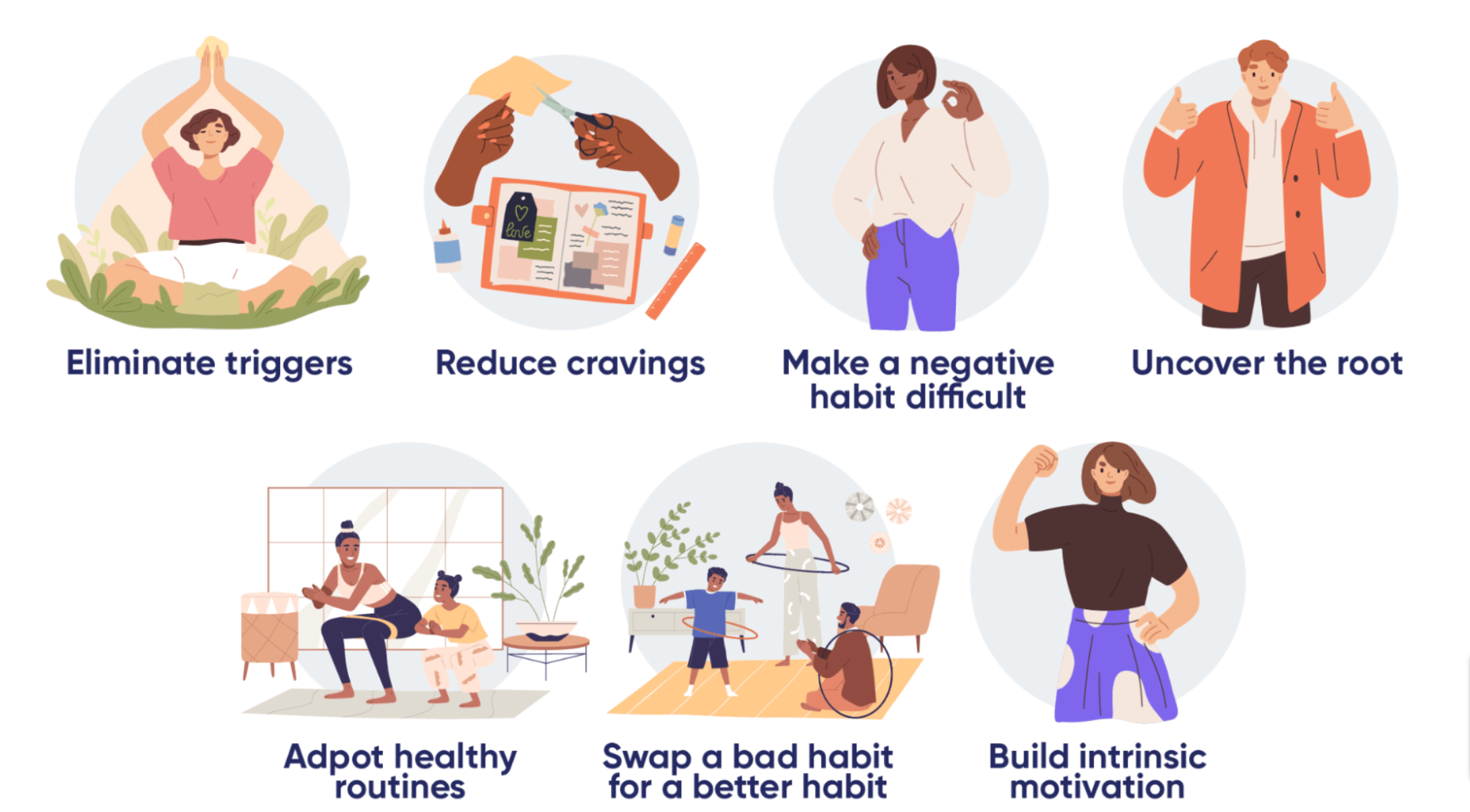Understanding the Function and Formation of Habits
Habits essentially function as automated responses in our daily life, developed over time through repeated actions and behaviors. Understanding the dynamics of habit formation- which involves cues, routines, and rewards, plays an integral role in successfully adopting and maintaining positive habits that can drastically improve physical and mental well-being.
Essential Elements of Habit Formation
Habit formation requires a trigger, a routine, and a reward. A trigger is what sets off an action, which is then followed by a routine that, if repeatedly practiced, becomes an automatic habit loop. The reward is the positive feelings or outcomes that the habit delivers, which reinforces the habit loop and makes it easier to repeat.
Changing Existing Habits: A Multifaceted Process
Altering or changing habits may require examining old habits and replacing routine actions with new habits that lead to the same reward. Understanding the underlying drivers of a bad habit is the first step toward replacing it with a good habit. This process can also involve rewards and punishments as a method to encourage and reinforce the adoption of new habits.
The Role of Positive Habits in Mental and Physical Wellness
Positive, healthy habits significantly contribute to overall health. Regular physical activity, ensuring adequate sleep hygiene, and maintaining a healthy eating regime can lead to better health and productivity levels, thus enhancing one’s quality of life.
How Physical Habits Impact Health and Productivity
Frequent physical activity boosts both physical and mental health by helping to reduce stress, prevent health problems and enhance overall productivity. Incorporating regular exercise into your daily routine or developing habits like walking or cycling to work can contribute to an improved overall well-being.
Mental Health Benefits of Structured Routine
A structured daily routine, which includes time for relaxation and hobbies, has a profound impact on mental health, helping reduce anxiety and improve brain health. Having a structured routine that includes self-care and positive social interactions can also significantly enhance overall contentment and productivity.
Strategies for Revitalizing Your Routine: How to Cultivate Positive Habits
Cultivating positive habits involves focusing on long-term health benefits rather than seeking instant gratification. This may also take time, patience, and a consistent commitment to the goal.
Steps to Ensure Habit Sustainability and Progress Monitoring
Start by setting achievable goals. Central to creating a new habit is ensuring the habit is sustainable. Regular checkups of your progress can help you stay accountable. Progress monitoring aids in identifying what is working and where adjustments might be needed.
Reward Mechanisms: Reinforcing New Routine
Using rewards effectively can spur motivation, thus reinforcing the adoption of the new habits. Celebrating small wins can be a significant motivator especially when instigating changes to longstanding habits.
Setbacks and Troubleshooting: Staying Motivated During Habit Transition
Setbacks are unavoidable when changing habits, but they don’t signify failure. Instead, they should be seen as opportunities for growth and learning.
Enhancing Social and Interactive Habits
Social habits, like positive communication and interaction habits, are critical components of personal relationships as they play a significant role in fostering healthy connections with friends and family.
Communication for Success: Building Habits in Group Dynamics
Working in a group often requires cultivating habits that foster group dynamics. Effective listening, respect for others’ rights reserved opinions, and active participation can boost team performance and personal growth.
Social Habits and Personal Relationships: The Link
Maintaining healthy social habits can help you get along with others and build meaningful relationships. By avoiding negative social habits, such as excessive use of social media, one can provide more time for in-person interactions.

Breaking the Loop: Techniques for Changing Unhealthy Habits
A crucial component of changing unhealthy habits is understanding the nature and function of the habit loop. This process involves identifying triggers, replacing bad habits with positive ones, and focusing on the rewards that these new habits bring.
Identifying Triggers: Understanding the Habit Loop
Recognizing the cues or triggers that start the habit loop empowers us to take control of our actions. The key is to replace a bad habit with a healthy habit without altering the trigger or the reward.
Moving Forward: Replacement and Adjustment of Unhealthy Routines
To change unhealthy habits, target the routine part of the habit loop first. Replacing a harmful routine with a healthier one while keeping the same reward can effectively intervene in a bad habit.
Habit Evaluation: Regular Check-ups and Adjustments for Your Routine
Regular review and adjustments are crucial to habit maintenance. Keeping progress on track can be challenging, however, with the right tools and self-discipline, you can succeed.
Keeping Progress on Track: Monitoring and Adapting
Keeping tabs on progress is crucial. Regular check-ins allow for adjustments to be made as necessary, ensuring that the new habits are not only beneficial but also achievable and enjoyable.
Enduring Challenges: The Importance of Self-Discipline
Self-discipline is at the heart of any successful habit change. It empowers us to continue pursuing our goals, even when the initial excitement wanes or challenges arise.
Successful Habit Formation: Closing Thoughts and Next Steps
To achieve a healthy lifestyle, it’s crucial to remember that change takes time, perseverance, and consistency. Keep in mind, though, that the rewards are immense. The Impact of Positive Habits on Overall Well-being cannot be understated—indicating that these efforts are well worth it.

